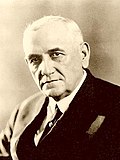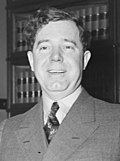This article includes a list of references, related reading, or external links, but its sources remain unclear because it lacks inline citations .(September 2013) |
January 15, 1924 (first round) February 19, 1924 (runoff) | |||||||||||||||||||||
| |||||||||||||||||||||
Results by parish Fuqua: 40–50% 50–60% 60–70% 70–80% 80–90% >90% Bouanchaud 40–50% 50–60% 60–70% 70–80% 80–90% Long 40–50% 50–60% 60–70% 70–80% | |||||||||||||||||||||
| |||||||||||||||||||||
| Elections in Louisiana |
|---|
 |
The 1924 Louisiana gubernatorial election was held in two rounds on January 15 and February 19, 1924. Like most Southern states between the Reconstruction Era and the Civil Rights Movement, Louisiana's Republican Party was virtually nonexistent in terms of electoral support. This meant that the two Democratic Party primaries held on these dates were the real contest over who would be governor. The 1924 election saw Henry L. Fuqua defeat Hewitt Bouanchaud to become Governor of Louisiana, and saw the beginning of the political rise of Huey P. Long Jr., who came in a surprisingly strong third.




